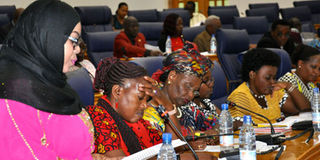Law compelling EAC states to prosecute human traffickers passed

Ms Maryam Ussi presents the Report of the Committee on Legal Rules and Privileges on behalf of the substantive Chair Peter Mathuki when the Eala Assembly met. PHOTO | COURTESY
What you need to know:
- The Bill was moved by Ms Dora Byamukama and received affirmation on Tuesday afternoon from the entire House as it resumed for its second meeting of the 5th session in Zanzibar, Tanzania.
- In comparing the magnitude of the problem in these countries with others, the committee referred to the Trafficking in Persons Report published yearly by the Department of State of the United States (US).
The East African Legislative Assembly (Eala) has enacted a law that will compel its five countries to prosecute those involved in human trafficking.
The Anti-Trafficking in Persons Bill, 2016, comes into force after a global report showed that human trafficking was prevalent in Kenya, Uganda, Tanzania, Burundi and Rwanda.
The Bill was moved by Ms Dora Byamukama and received affirmation on Tuesday afternoon from the entire House as it resumed for its second meeting of the 5th session in Zanzibar, Tanzania.
“The object of the Bill is to provide a legal framework for the prevention of trafficking in persons, protection mechanisms and services for victims of and development of partnerships for co-operation to counter trafficking in persons in the community,” said a statement from the EAC secretariat.
The law will be operational once the Heads of State in the respective countries assent to it in line with Article 63 of the Treaty of the Establishment of the EAC.
In the event that all the Presidents sign, it shall become an Act of the Community, being superior to other laws on the same matter.
According to the statement, the debate on the Bill was preceded by the tabling and presentation of a report of the committee on Legal rules and privileges on the EAC Anti-Trafficking in Persons Bill, 2016.
The report presented by Mr Maryam Ussi, followed public hearings on the subject matter held across the five countries in September 2016.
The report among other things, ascertains that the crime of trafficking in persons is prevalent in the region.
In comparing the magnitude of the problem in these countries with others, the committee referred to the Trafficking in Persons Report published yearly by the Department of State of the United States (US).
The report ranks all countries in the world into four categories dubbed “Tiers” basing on the respective government’s efforts against trafficking as measured by the Trafficking Victims Protection Act of 2000 standards. There are four tiers.
The key parameters considered in ranking countries are actions taken in the prosecution, protection and prevention sections of trafficking in persons of that country.
Tier 1 comprises countries whose governments fully meet the victims’ protection standards while Tier 2 encompasses countries that do not fully comply with the rules
Tier 3 on its part do not fully comply with the minimum standards and are yet to make significant efforts to do so.
According to the Trafficking in Persons Report, published in 2016, Kenya and Uganda are grouped under Tier 2, Rwanda and Tanzania under Tier 2 watch list, while the Republic of Burundi falls under Tier 3.
During the public hearings and interactions in the partner states, stakeholders called for tightening of the Bill.
They further suggested the proposed minimum penalty of ten years of imprisonment for offenders engaged in trafficking in persons was too lenient and that it should be stepped up.
For Burundi, the legislators were told that parents should be encouraged to take measures towards keeping their children within the family set-ups, while respective Embassies and missions abroad, should be tasked with liberating and repatriating victims found within their respective stations of duty.
In Tanzania, Eala members were tasked to ensure the Bill provides for the protection of disabled people and for the protection of witnesses. They further called on the law to criminalize perpetrators, promoters and facilitators of the offence.
While in Rwanda, legislators were urged to ensure the Bill provides a provision for return of trafficked persons from the hosting partner State. This, they suggest should be preceded by a risk assessment and with due regard for his/her safety to the home country.
“The EAC partner States should form specialised units or focal point offices to handle various aspects of human trafficking like child labour, and prostitution,” the members were informed.
The committee also noted that the Republics of Burundi, Kenya, Uganda and the United Republic of Tanzania, have specific laws on counter-trafficking in persons and which are in tandem with the UN Protocol.
However, the penalties for offences under the joint law differ from one jurisdiction to another.
The Republic of Rwanda is yet to enact a specific law on counter trafficking in persons even though, offences and penalties for trafficking in persons are provided for under the Penal Code.





